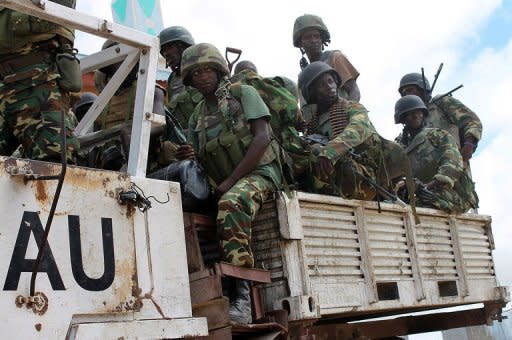AU, Somali troops attack Islamist stronghold of Afgoye
African Union and Somali troops launched a long-awaited assault Tuesday against the Al-Qaeda linked Shebab stronghold of Afgoye, the world's largest displaced people's camp, officials said. Residents reported intense clashes and heavy artillery fire on the outskirts of Mogadishu as tanks and troops pushed out in a pre-dawn attack from Deynile, a suburb of the capital. Fighting was reported to calm later in the day. "The African Union Mission in Somalia (AMISOM) and the Somali National Army launched a carefully planned operation to bring security and stability to the people of the Afgoye corridor," an AU statement read. Over 400,000 people, around one third of all the displaced people in Somalia, were still living in the Afgoye corridor at the start of the year, fleeing war or drought, according to the UN, who warned that civilians must be protected. "The protection of the displaced Somalis is our priority," said Kilian Kleinschmidt, the UN's deputy humanitarian coordinator in Somalia. Witnesses said civilians in the battle zone were fleeing the fighting. "Several artillery rounds struck the KM13 area, and families who had remained in the area started fleeing," said Muhidiin Adan, a resident in Deynile. While the Shebab claimed the attack had been repelled, the AU said their troops were "making good progress" and the Somali army said Shebab fighters were fleeing ahead of the advancing soldiers. "The remnants of the Al-Qaeda militants have already suffered a major defeat and they have emptied their barracks in the area," said Mohamed Osmail, a Somali military official. "The army cut off a key road on the outskirts of Deynile, which the enemy has been using when organising attacks and transporting fighters to undermine the security of the city, they are no longer there now," he added. Deynile commands access to the Afgoye corridor, an area some 30 kilometres (20 miles) northwest of Mogadishu, which is controlled by the Shebab. Top Shebab official Sheikh Fuad Mohamed Shangole called on the people to rise up and attack the AU and government troops. "The enemy wants to destroy the religion of Allah by attacking the mujahedeen fighters, be assured that the Army of Allah will win and the enemy will lose in the battle," Shangole told the group's radio Al-Andalus. "I call on Muslims to unite to defend their religion and country from the enemy." The Shebab later claimed in a Twitter message that the attack was "successfully repelled" and that "the Deynile battlefront is going down in the history of Somali jihad as the largest graveyard of the AU forces." "The battle is still raging although now less fiercely," another message read. In recent months thousands of civilians have left Deynile for the capital, ahead of the expected assault on Shebab bases, where many retreated to after pulling out of fixed positions in Mogadishu last year. "AMISOM are taking every precaution to prevent harm or injury to civilians - we will only fight when attacked by the Al-Shebab," force commander Lieutenant General Andrew Gutti said in a statement. "We ask the population of the Afgoye corridor to continue to stay in their places of residence, avoid unnecessary travel on main roads and not to stray far from their homes." AU and Somali troops have made significant gains in recent months against Shebab militants, although the Islamists have switched to guerrilla tactics in Mogadishu, including a series of suicide and grenade attacks. Somalia's weak and Western-backed transitional administration has until August to set up a permanent government, but the international community has expressed concern it is failing to meet key deadlines. Fighting erupted in Somalia in the late 1980s, escalating into a brutal civil war following a 1991 coup, with rival militias, warlords and Islamist fighters battling ever since for control of the Horn of Africa nation. The mandate of the transitional government has already been extended several times, and Western nations say it cannot be extended again.




